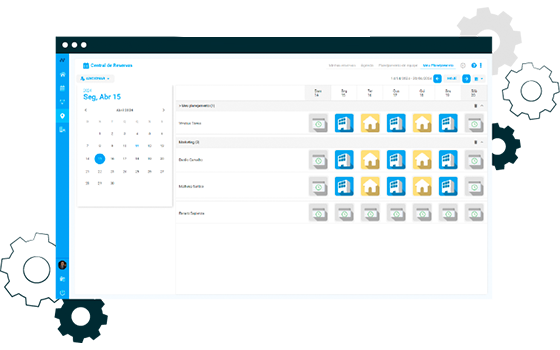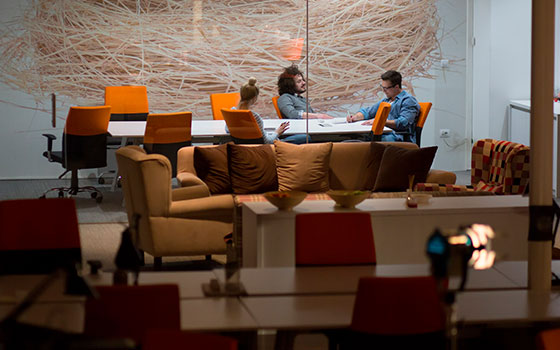Productivity in the workplace is a crucial factor for the success of any company. However, many organizations do not realize the significant impact that inadequate space management can have on the efficiency and performance of employees.
Misused spaces not only create a disorganized environment, but can also cause distractions, increase stress and reduce team motivation. In this article, we will explore how misuse of work spaces affects productivity and what can be done to optimize the use of the corporate environment, including modern trends such as "Activity Based Working" (ABW), hot desking, work planning and the essential role of Neptune in this process.
A well-planned work environment is essential to ensuring that employees can perform their tasks efficiently and comfortably. According to a study conducted by Cornell University, employees who work in well-designed environments are 16% more productive than those in poorly organized spaces. Moreover, an organized workplace can reduce stress and increase employee satisfaction, contributing to a healthier and more collaborative work environment.
Disorganized and poorly planned environments can increase the level of distractions or interruptions, making it difficult for employees to concentrate. A Harvard Business Review study revealed that noisy, disorganized work environments can reduce productivity by up to 20%.
The absence of dedicated areas for meetings and collaboration can make teamwork difficult. Without suitable spaces for discussions and brainstormings, employees may find it difficult to share ideas and solve problems efficiently.

Misused spaces often result in inappropriate working settings, leading to ergonomic problems. This can cause physical discomfort, increase the risk of injury, and decrease employee productivity.
Office layouts that do not take into account the efficient handling of employees can result in loss of time and increased fatigue. Studies show that employees who need to travel frequently in poorly planned environments can waste up to 30 minutes a day just on unnecessary movements.
ABW is an approach that recognizes that different activities require different types of spaces. Instead of each employee having a fixed table, they choose the environment that best suits the task they are performing – be it a quiet space for concentration, a collaborative area for team meetings or a lounge for relaxation. This flexibility can increase employee productivity and satisfaction, promoting more efficient use of space.
This concept involves not assigning fixed desks to employees. Instead, they can choose any desk available when they arrive at work. Hot desking can reduce operating costs and maximize space use, but it must be well managed to avoid the feeling of lack of belonging or disorganization.

Work planning is a practice that involves the detailed organization of the hours and places of work of employees. With work planning tools, companies can optimize the use of their spaces, ensure that everyone has access to the resources they need, and facilitate the implementation of hybrid work models. These tools help create efficient work scales, reducing scheduling conflicts and improving team-to-team collaboration.
To mitigate the problems caused by poorly used spaces, companies should invest in strategies to optimize the workplace
To mitigate the problems caused by poorly used spaces, companies should invest in strategies to optimize the work environment. Here are some effective approaches:
Carry out a detailed analysis of the needs of employees and plan the layout of the office accordingly. This includes the creation of specific areas for individual work, collaboration, rest and meetings.
Implementing a meeting room reservation system, such as the one offered by Neptune, can help to better organize the use of available spaces, ensuring that rooms are used efficiently and that employees have access to appropriate spaces when needed.
Investing in ergonomic furniture can improve employee comfort and reduce work-related health problems, thereby increasing productivity and job satisfaction.
Using technological tools to monitor and analyze space usage can provide valuable insights into how working environments are being used and where improvements can be made. Neptune, for example, offers advanced space management solutions that help optimize the work environment and increase productivity.
Encouraging employees to provide feedback on the layout and use of spaces can help identify problems and implement solutions that meet their needs.

Neptune is an essential tool for any company that seeks to increase productivity and adapt to new trends in workplace management. With advanced features for meeting room reservation, work planning and hot desking, Neptune offers a complete solution to optimize the use of the desktop environment. Studies show that companies using Neptune report an average 20% increase in the productivity of their teams and a reduction of up to 25% in space management operating costs.
Effective workplace management is crucial to ensuring the productivity and well-being of employees. Misused spaces not only reduce efficiency, but can also negatively affect the morale and health of employees. By adopting modern trends such as Activity Based Working, hot desking and work planning, and investing in work environment optimization strategies, companies can create spaces that promote collaboration, concentration and well-being, resulting in a significant increase in productivity and organizational success. Tools like Neptune are essential in this process, offering innovative solutions that help transform the work environment and better results.